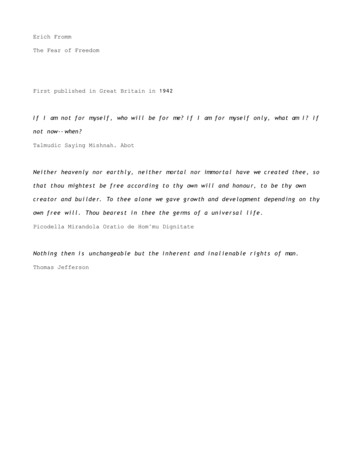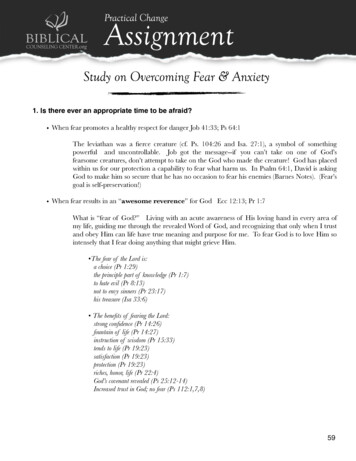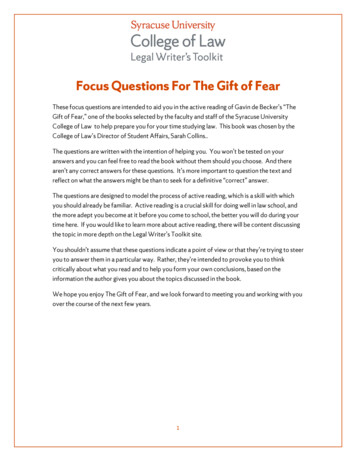
Transcription
Erich FrommThe Fear of FreedomFirst published in Great Britain in 1942I f I am no t f o r myse l f , who wi l l be f o r me? I f I am f o r myse l f on l y, wha t am I ? I fno t now- - when ?Talmudic Saying Mishnah, AbotNe i t he r heaven l y no r ea r t h l y, ne i t he r mor ta l no r immor t a l have we c r ea t ed t hee , s ot ha t t hou migh te s t be f r ee a c co rd i n g t o t h y own wi l l and honou r, t o be t h y ownc r ea t o r and bu i l d e r. To t hee a l one we ga ve g r owth and deve l opmen t depend i n g on t h yown f r ee wi l l . Thou bea re s t i n t hee t he ge rms o f a un i v e r s a l l i f e .Picodella Mirandola Oratio de Hom'mu DignitateNoth i n g t hen i s unchangeab l e bu t t he i n he r en t and i n a l i e nab l e r i gh t s o f man .Thomas Jefferson
ContentsForewordviiii Freedom--A Psychological Problem? i2 The Emergence of the Individual and theAmbiguity of Freedom 193 Freedom in the Age of the Reformation 331 Medieval Background and the Renaissance 332 The Period of the Reformation 544 The Two Aspects of Freedom for Modern Man 895 Mechanisms of Escape1171 Authoritarianism1222 Destructiveness1533 Automaton Conformity 1586 Psychology of Nazism1787 Freedom and Democracy 2071 The Illusion of Individuality 2072 Freedom and Spontaneity 221Appendix: Character and the SocialProcess238Index257
ForewordThis book is part of a broad study concerning the character structure of modernman and the problems of the interaction between psychological and sociologicalfactors which I have been working on for several years and completion of whichwould have taken considerably longer. Present political developments and thedangers which they imply for the greatest achievements of modern culture-individuality and uniqueness of personality--made me decide to interrupt the workon the larger study and concentrate on one aspect of it which is crucial for thecultural and social crisis of our day: the meaning of freedom for modern man. Mytask in this book would be easier could I refer the reader to the completed studyof the character structure of man in our culture, since the meaning of freedom canbe fully understood only on the basis of an analysis of the whole characterstructure of modern man. As it is, I have had to refer frequently to certainconcepts and conclusions without elaborating on them as fully as 1 would have donewith more scope. In regard to other problems of great importance, I haveFOREWORD IXoften been able to mention them only in passing and sometimes not at all. But Ifeel that the psychologist should offer what he has to contribute to theunderstanding of the present crisis without delay, even though he must sacrificethe desideratum of completeness.Pointing out the significance of psychological considerations in relation to thepresent scene does not imply, in my opinion, an overestimation of psychology. Thebasic entity of the social process is the individual, his desires and fears, hispassions and reason, his propensities for good and for evil. To understand thedynamics of the social process we must understand the dynamics of thepsychological processes operating within the individual, just as to understand theindividual we must see him in the context of the culture which moulds him. It isthe thesis of this book that modern man, freed from the bonds ofpreindividualistic
society, which simultaneously gave him security and limited him,has not gained freedom in the positive sense of the realization of his individualself; that is, the expression of his intellectual, emotional and sensuouspotentialities. Freedom, though it has brought him independence and rationality,has made him isolated and, thereby, anxious and powerless. This isolation isunbearable and the alternatives he is confronted with are either to escape fromthe burden of this freedom into new dependencies and submission, or to advance tothe full realization of positive freedom which is based upon the uniqueness andindividuality of man. Although this book is a diagnosis rather than a prognosis-an analysis rather than a solution--its results have a bearing on our course ofaction. For, the understanding of the reasons for the totalitarian flight fromfreedom is a premise for any action which aims at the victory over thetotalitarian forces.I forgo the pleasure it would be to thank all those friends, colleagues andstudents to whom I am indebted for their stimulation and constructive criticismsof my own thinking. TheX FOREWORDreader will see in the footnotes reference to die authors to whom I feel mostindebted for the ideas expressed in this book. However, I wish to acknowledgespecifically my gratitude to those who have contributed directly to the completionof this volume. In the first place, I wish to thank Miss Elizabeth Brown, who bothby her suggestions and her criticisms has been of invaluable help in theorganization of this volume. Furthermore, my thanks are due to Mr. T. Woodhousefor his great help in editing the manuscript and to Dr. A. Seidemann for his helpin the philosophical problems touched upon in this book.I wish to thank the following publishers for the privilege of using extensivepassages from their publications: Board of Christian Education, Philadelphia,excerpts from Institutes of the Christion Religion, by John Calvin, translated byJohn Allen; the Columbia Studies in History, Economics, and Public Law (Columbia
University Press), New York, excerpts from Social Reform and the Reformation, byJacob S. Schapiro; Wm. B. Eerdmans Publishing Co., Grand Rapids, Mich., excerptsfrom The Bondage of the Will, by Martin Luther, translated by Henry Cole; JohnMurray, London, excerpts from Religion and the Rise ol Capitalism, by R. 11.Tawney; Hurst and Blackett, London, excerpts from Mein Kampf, by Adolf Hitler;Allen and Unwin, London, excerpts from The Civilization of the Renaissance inItaly, by Jacob Burckhardt.E.F.1FREEDOM--A PSYCHOLOGICAL PROBLEM?Modern European and American history is centred around the effort to gain freedomfrom the political, economic, and spiritual shackles that have bound men. Thebattles for freedom were fought by the oppressed, those who wanted new liberties,against those who had privileges to defend. While a class was fighting for its ownliberation from domination, it believed itself to be fighting for human freedom assuch and thus was able to appeal to an ideal, to the longing for freedom rooted inall who are oppressed. In the long and virtually continuous battle for freedom,however, classes that were fighting against oppression at one stage sided with theenemies of freedom when victory was won and new privileges were to be defended.Despite many reverses, freedom has won battles. Many died in those battles in theconviction that to die in the struggle against oppression was better than to livewithout freedom. Such a death was the utmost assertion of their individuality.History seemed2 THE FEAR OF FREEDOMto be proving that it was possible for man to govern himself, to make decisionsfor himself and to think and feel as he saw fit. The full expression of man'spotentialities seemed to be the goal towards which social development was rapidlyapproaching. The principles of economic liberalism, political democracy, religiousautonomy, and individualism in personal life, gave expression to the longing for
freedom, and at the same time seemed to bring mankind nearer to its realization.One tie after another was severed. Man had overthrown the domination of nature andmade himself her master; he had overthrown the domination of the Church and thedomination of the absolutist state. The abolition of external domination seemed tobe not only a necessary but also a sufficient condition to attain the cherishedgoal: freedom of the individual.The World War was regarded by many as the final struggle and its conclusion theultimate victory for freedom. Existing democracies appeared strengthened, and newones replaced old monarchies. But only a few years elapsed before new systemsemerged which denied everything that men believed they had won in centuries ofstruggle. For the essence of these new systems, which effectively took command ofman's entire social and personal life, was the submission of all but a handful ofmen to an authority over which they had no control.At first many found comfort in the thought that the victory of the authoritariansystem was due to the madness of a few individuals and that their madness wouldlead to their downfall in due time. Others smugly believed that the Italianpeople, or the Germans, were lacking in a sufficiently long period of training indemocracy, and that therefore one could wait complacently until they had reachedthe political maturity of the Western democracies. Another common illusion,perhaps the most dangerous of all, was that men like Hitler had gained power overthe vast apparatus of the state through nothing but cunning and trickery, thatthey and their satellites ruled merely by sheer force;FREEDOM----A PSYCHOLOGICAL PROBLEM? 3that the whole population was only the will-less object of betrayal and terror.In the years that have elapsed since, the fallacy of these arguments has becomeapparent. We have been compelled to recognize that millions in Germany were aseager to surrender their freedom as their fathers were to fight for it; thatinstead of wanting freedom, they sought for ways of escape from it; that othermillions were indifferent and did not believe the defence of freedom to be worth
fighting and dying for. We also recognize that the crisis of democracy is not apeculiarly Italian or German problem, but one confronting every modern state. Nordoes it matter which symbols the enemies of human freedom choose: freedom is notless endangered if attacked in the name of anti-Fascism or in that of outrightFascism.1 This truth has been so forcefully formulated by John Dewey that Iexpress the thought in his words: "The serious threat to our democracy", he says,"is not the existence of foreign totalitarian states. It is the existence withinour own personal attitudes and within our own institutions of conditions whichhave given a victory to external authority, discipline, uniformity and dependenceupon The Leader in foreign countries. The battlefield is also accordingly here-within ourselves and our institutions."If we want to fight Fascism we must understand it. Wishful thinking will not helpus. And reciting optimistic formulae will prove to be as inadequate and useless asthe ritual of an Indian rain dance.In addition to the problem of the economic and social conditions which have givenrise to Fascism, there is a human problem which needs to be understood. It is thepurpose of this book to analyse those dynamic factors in the character structureof' I use die term Fascism or authoritarianism to denote a dictatorial system of thetype of the German or Italian one. If I mean the German system in particular. Ishall call it Nazism. ' John Dewey, Freedom and Culture, Allen & Unwin, London,1940.TH E FEAR OF FREEDOMmodern man, which made him want to give up freedom in Fascist countries and whichso widely prevail in millions of our own people.These are the outstanding questions that arise when we look at the human aspect offreedom, the longing for submission, and the lust for power: What is freedom as ahuman experience? Is the desire for freedom something inherent in human nature? Isit an identical experience regardless of what kind of culture a person lives in,
or is it something different according to the degree of individualism reached in aparticular society? Is freedom only the absence of external pressure or is it alsothe presence of something--and if so, of what? What are the social and economicfactors in society that make for the striving for freedom? Can freedom become aburden, too heavy for man to bear, something he tries to escape from? Why then isit that freedom is for many a cherished goal and for others a threat?Is there not also, perhaps, besides an innate desire for freedom, an instinctivewish for submission? If there is not, how can we account for the attraction whichsubmission to a leader has for so many to-day? Is submission always to an overtauthority, or is there also submission to internalized authorities, such as dutyor conscience, to inner compulsions or to anonymous authorities like publicopinion? Is there a hidden satisfaction in submitting, and what is its essence?What is it that creates in men an insatiable lust for power? Is it the strength oftheir vital energy--or is it a fundamental weakness and inability to experiencelife spontaneously and lovingly? What are the psychological conditions that makefor the strength of these strivings? What are the social conditions upon whichsuch psychological conditions in turn are based?Analysis of the human aspect of freedom and of authoritarianism forces us toconsider a general problem, namely, that of the r le which psychological factorsplay as active forces in the social process; and this eventually leads to theproblem of theFREEDOM----A PSYCHOLOGICAL PROBLEM? 5interaction of psychological, economic, and ideological factors in the socialprocess. Any attempt to understand the attraction which Fascism exercises upongreat nations compels us to recognize the r le of psychological factors. For weare dealing here with a political system which, essentially, does not appeal torational forces of self-interest, but which arouses and mobilizes diabolicalforces in man which we had believed to be nonexistent, or at least to have diedout long ago. The familiar picture of man in the last centuries was one of a
rational being whose actions were determined by his self-interest and the abilityto act according to it. Even writers like Hobbes, who recognized lust for powerand hostility as driving forces in man, explained the existence of these forces asa logical result of self-interest: since men are equal and thus have the same wishfor happiness, and since there is not enough wealth to satisfy them all to thesame extent, they necessarily fight against each other and want power to securethe future enjoyment of what they have at present. But Hobbes's picture becameoutmoded. The more the middle class succeeded in breaking down the power of theformer political or religious rulers, the more men succeeded in mastering nature,and the more millions of individuals became economically independent, the more didone come to believe in a rational world and in man as an essentially rationalbeing. The dark and diabolical forces of man's nature were relegated to the MiddleAges and to still earlier periods of history, and they were explained by lack ofknowledge or by the cunning schemes of deceitful kings and priests.One looked back upon these periods as one might at a volcano which for a long timehas ceased to be a menace. One felt secure and confident that the achievements ofmodern democracy had wiped out all sinister forces; the world looked bright andsafe like the well-lit streets of a modern city. Wars were supposed to be the lastrelics of older times and one needed just one more war to end war; economic criseswere supposed to be accidents,6 THE FEAR OF FREEDOMeven though these accidents continued to happen with a certain regularity.When Fascism came into power, most people were unprepared, both theoretically andpractically. They were unable to believe that man could exhibit such propensitiesfor evil, such lust for power, such disregard for the rights of the weak, or suchyearning for submission. Only a few had been aware of the rumbling of the volcanopreceding the outbreak. Nietzsche had disturbed the complacent optimism of thenineteenth century; so had Marx in a different way. Another warning had comesomewhat later from Freud. To be sure, he and most of his disciples had only a
very na ve notion of what goes on in society, and most of his applications ofpsychology to social problems were misleading constructions; yet, by devoting hisinterest to the phenomena of individual emotional and mental disturbances, he ledus to the top of the volcano and made us look into the boiling crater.Freud went further than anybody before him in directing attention to theobservation and analysis of the irrational and unconscious forces which determineparts of human behaviour. He and his followers in modern psychology not onlyuncovered the irrational and unconscious sector of man's nature, the existence ofwhich had been neglected by modern rationalism; he also showed that theseirrational phenomena followed certain laws and therefore could be understoodrationally. He taught us to understand the language of dreams and somatic symptomsas well as the irrationalities in human behaviour. He discovered that theseirrationalities as well as the whole character structure of an individual werereactions to the influences exercised by the outside world and particularly bythose occurring in early childhood.But Freud was so imbued with the spirit of his culture that he could not go beyondcertain limits which were set by it. These very limits became limitations for hisunderstanding even of theFREEDOM----A PSYCHOLOGICAL PROBLEM? 7sick individual; they handicapped his understanding of the normal individual andof the irrational phenomena operating in social life.Since this book stresses the r le of psychological factors in the whole of thesocial process and since this analysis is based on some of the fundamentaldiscoveries of Freud--particularly those concerning the operation of unconsciousforces in man's character and their dependence on external influences--I think itwill be helpful to the reader to know from the outset some of the generalprinciples of our approach, and also the main differences between this approachand the classical Freudian concepts. 'Freud accepted the traditional belief in a basic dichotomy between men and
society, as well as the traditional doctrine of the evilness of human nature. Man,to him, is fundamentally anti-social. Society must domesticate him, must allowsome direct satisfaction of biological--and hence, ineradicable--drives; but forthe most part society must refine and adroitly check man's basic impulses. Inconsequence of this suppression of natural impulses by society somethingmiraculous happens: the suppressed drives turn into strivings that are culturallyvaluable and thus become the human basis for culture. Freud chose the wordsublimation for this strange transformation from suppression into civilizedbehaviour. If the amount of suppression is greater than the capacity ofsublimation, individuals become neurotic and it is necessary to allow thelessening of suppression. Generally, however, there is a reverse relation between1 A psychoanalytic approach which, though based on the fundamental achievements ofFreud's theory, yet differs from Freud in many important aspens is to be found inKaren Horney's New Ways in Psychoanalysis, Kegan Paul, London, 1939, and in HarryStack Sullivan's Concept ions of Modern Psychiatry--The First William AlansonWhite Memorial Lectures, Psychiatry, 1940, Vol. 3, No, I. Although the two authorsdiffer in many respects, the viewpoint offered here has much in common with theviews of both.8 THE FEAR OF FREEDOMsatisfaction of man's drives and culture: the more suppression, the more culture(and the more danger of neurotic disturbances). The relation of the individual tosociety in Freud's theory is essentially a static one: the individual remainsvirtually the same and becomes changed only in so far as society exercises greaterpressure on his natural drives (and thus enforces more sublimation) or allows moresatisfaction (and thus sacrifices culture).Like the so-called basic instincts of man which earlier psychologists accepted,Freud's conception of human nature was essentially a reflection of the mostimportant drives to be seen in modern man. For Freud, the individual of hisculture represented "man", and those passions and anxieties that are
characteristic for man in modern society were looked upon as eternal forces rootedin the biological constitution of man.While we could give many illustrations of this point (as, for instance, the socialbasis for the hostility prevalent today in modern man, the dipus complex, thesocalledcastration complex in women), I want only to give one more illustrationwhich is particularly important because it concerns the whole concept of man as asocial being. Freud always considers the individual in his relations to others.These relations as Freud sees them, however, are similar to the economic relationsto others which are characteristic of the individual in capitalist society. Eachperson works for himself, individualistically, at his own risk, and not primarilyin co-operation with others. But he is not a Robinson Crusoe; he needs others, ascustomers, as employees, or as employers. He must buy and sell, give and take. Themarket, whether it is the commodity or the labour market, regulates theserelations. Thus the individual, primarily alone and self-sufficient, enters intoeconomic relations with others as means to one end: to sell and to buy. Freud'sconcept of human relations is essentially the same: the individual appears fullyequipped with biologically given drives, which need to be satisfied. In order tosatisfy them, the individual enters into relationsFREEDOM----A PSYCHOLOGICAL PROBLEM? 9with other "objects". Other individuals thus are always a means to one's end, thesatisfaction of strivings which in themselves originate in the individual beforehe enters into contact with others. The field of human relations in Freud's senseis similar to the market--it is an exchange of satisfaction of biologically give needs, in which the relationship to the oilier individual is always a means to anend but never an end in itself.Contrary to Freud's viewpoint, the analysis offered in this book is based on theassumption that the key problem of psychology is that of the specific kind ofrelatedness of the individual towards the world and not that of the satisfaction
or frustration of this or that instinctual need perse; furthermore, on theassumption that the relationship between man and society is not a static one. Itis not as if we had on the one hand an individual equipped by nature with certaindrives and on the other, society as something apart from him, either satisfying orfrustrating these innate propensities. Although there are certain needs, such ashunger, thirst, sex, which are common to man, those drives which make for thedifferences in men's characters, like love and hatred, the lust for power and theyearning for submission, the enjoyment of sensuous pleasure and the fear of it,are all products of the social process. The most beautiful as well as the mostugly inclinations of man are not part of a fixed and biologically given humannature, but result from the social process which creates man. In other words,society has not only a suppressing function--although it has that too--but it hasalso a creative function. Man's nature, his passions, and anxieties are a culturalproduct; as a matter of fact, man himself is the most important creation andachievement of the continuous human effort, the record of which we call history.It is the very task of social psychology to understand this process of man'screation in history. Why do certain definite changes of man's character take placefrom one historical epoch to another? Why is the spirit of the Renaissancedifferent from10 THE FEAR OF FREEDOMthat of the Middle Ages? Why is the character structure of man in monopolisticcapitalism different from that in the nineteenth century? Social psychology has toexplain why new abilities and new passions, bad or good, come into existence. Thuswe find, for instance, that from the Renaissance up until our day men have beenfilled with a burning ambition for fame, while this striving which to-day seems sonatural was little present in man of the medieval society.l In the same period mendeveloped a sense for the beauty of nature which they did not possess before.1Again, in the Northern European countries, from the sixteenth century on, mandeveloped an obsessional craving to work which had been lacking in a free man
before that period.But man is not only made by history--history is made by man. The solution of thisseeming contradiction constitutes the field of social psychology.3 Its task is toshow not only how passions, desires, anxieties change and develop as a result ofthe social process, but also how man's energies thus shaped into specific forms intheir turn become productive forces, moulding the social process. Thus, forinstance, the craving for fame and success and the drive to work are forceswithout which modern capitalism could not have developed; without these and anumber of other human forces man would have lacked the impetus to act according tothe social and economic requirements of the modern commercial and industrialsystem.It follows from what we have said that the viewpoint presented in this bookdiffers from Freud's inasmuch as it emphatically disagrees with his interpretationof history as the1 Cf Jacob Burckhardr, The Civilization of the Renaissance in Italy, Allen &Unwin,London, 1921, p. 139 ff.! op.cit.,p. 299 ff,' Cf the con tr ihm ion s of the sociologists]. Dollard, K. Mannheim and H. D.Lasswell, of the anthropologists R. Benedict, J. Hallowell, R. Linton, M. Mead,E. Sapir and A. Kardiner's application of psychoanalytic conceptstoanthropology.FREEDOM----A PSYCHOLOGICAL PROBLEM?result of psychological forces that in themselves are not socially conditioned. Itdisagrees as emphatically with those theories which neglect the r le of the humanfactor as one of the dynamic elements in the social process. This criticism isdirected not only against sociological theories which explicitly wish to eliminatepsychological problems from sociology (like those of Durkheim and his school), but
also against those theories that are more or less tinged with behaviouristicpsychology. Common to all these theories is the assumption that human nature hasno dynamism of its own and that psychological changes are to be understood interms of the development of new "habits" as an adaptation to new culturalpatterns. These theories, though speaking of the psychological factor, at the sametime reduce it to a shadow of cultural patterns. Only a dynamic psychology, thefoundations of which have been laid by Freud, can get further than paying lipservice to the human factor. Though there is no fixed human nature, we cannotregard human nature as being infinitely malleable and able to adapt itself to anykind of conditions without developing a psychological dynamism of its own. Humannature, though being the product of historical evolution, has certain inherentmechanisms and laws, to discover which is the task of psychology.At this point it seems necessary for the full understanding of what has been saidso far and also of what follows to discuss the notion of adaptation. Thisdiscussion offers at the same time an illustration of what we mean bypsychological mechanisms and laws.It seems useful to differentiate between "static" and "dynamic" adaptation. Bystatic adaptation we mean such an adaptation to patterns as leaves the wholecharacter structure unchanged and implies only the adoption of a new habit. Anexample of this kind of adaptation is the change from the Chinese habit of eatingto the Western habit of using fork and knife. A Chinese coming to America willadapt himself to this new12 THE FEAR OF FREEDOMpattern, but this adaptation in itself has little effect on his personality; itdoes not arouse new drives or character traits.By dynamic adaptation we refer to the kind of adaptation that occurs, for example,when a boy submits to the commands of his strict and threatening father--being toomuch afraid of him to do otherwise--and becomes a "good" boy. While he adaptshimself to the necessities of the situation, something happens in him. He may
develop an intense hostility against his father, which he represses, since itwould be too dangerous to express it or even to be aware of it. This repressedhostility, however, though not manifest, is a dynamic factor in his characterstructure. It may create new anxiety and thus lead to still deeper submission; itmay set up a vague defiance, directed against no one in particular but rathertowards life in general. While here, too, as in the first case, an individualadapts himself to certain external circumstances, this kind of adaptation createssomething new in him, arouses new drives and new anxieties. Every neurosis is anexample of this dynamic adaptation; it is essentially an adaptation to suchexternal conditions (particularly those of early childhood) as are in themselvesirrational and, generally speaking, unfavourable to the growth and development ofthe child. Similarly, such socio-psyc ho logical phenomena as are comparable toneurotic phenomena (why they should not be called neurotic will be discussedlater), like the presence of strong destructive or sadistic impulses in socialgroups, offer an example of dynamic adaptation to social conditions that areirrational and harmful to the development of men.Besides the question of what kind of adaptation occurs, other questions need to beanswered: What is it that forces man to adapt himself to almost any conceivablecondition of life, and what are the limits of his adaptability?In answering these questions the first phenomenon we have to discuss is the factthat there are certain sectors in man's nature that are more flexible andadaptable than others. Those strivingsFREEDOM----A PSYCHOLOGICAL PROBLEM? 13and character traits by which men differ from each other show a great amount ofelasticity and malleability: love, destructiveness, sadism, the tendency tosubmit, the lust for power, detachment, the desire for self-aggrandizement, thepassion for
Thomas Jefferson. Contents Foreword viii i Freedom--A Psychological Problem? i 2 The Emergence of the Individual and the Ambiguity of Freedom 19 3 Freedom in the Age of the Refo










